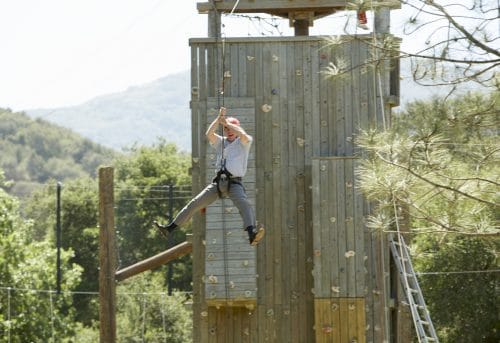You may be entitled to compensation following a zip line injury
 Flying through the air on a zip line can be a thrilling experience. But unfortunately, for more and more adventure seekers this seemingly innocuous activity is ending in personal injury.
Flying through the air on a zip line can be a thrilling experience. But unfortunately, for more and more adventure seekers this seemingly innocuous activity is ending in personal injury.
Zip Line Injuries are on the Rise
According to a study published this summer in the American Journal of Emergency Medicine, zip-line-related injuries are on the rise. During the study period (2009-2012), injuries increased by 70 percent. This works out to about 10 zip-line injuries each day. Of these injuries, 45 percent involve kids under the age of 10.
While most zip line injuries are relatively minor—including bruises, sprains and strains—there is also the potential for more serious trauma such as broken bones, concussions, and closed head injuries. About 11 percent of individuals who get hurt at zip line facilities will suffer one of these more serious injuries and require hospitalization.
Zip lining itself hasn’t suddenly become more risky; rather, the increase in injuries is primarily linked to the increase in facilities offering this activity. In 2001, there were just 10 commercial zip lines. In 2012, there were over 200, plus over 13,000 amateur zip lines operated by camps, parks, and outdoor education centers. In many states, amateur zip lines are not regulated. With no permitting requirements or other ways to guarantee compliance with industry standards, it is not surprising that many accidents and injuries happen at amateur zip lines.
How to Get Compensation for Zip Line Injuries
If you or your child has been injured on a zip line, you may be entitled to compensation for medical bills and other damages associated with the injury. Your ability to secure compensation will depend on:
Why the injury happened—Zip line operators are liable for injuries that occur due to their own negligence. If the injury was caused by the rider’s negligence, the zip line operator probably will not have to provide compensation. If the injury was caused by a defect in the zip line equipment, the manufacturer of that equipment may be liable.
Where the injury happened—Unfortunately, many private and amateur zip line operators carry little or no insurance. This lack of coverage can make it more difficult to recover full and fair compensation for your injuries, since you will have to target the zip line operator directly rather than going through their insurance company.
Whether you signed a waiver—Some zip line facilities require you to sign a waiver before riding their zip line. They may also print some kind of disclaimer on your entry ticket that can have a similar effect. Depending on the specific situation, a waiver can prevent you from filing a personal injury claim.
Ask an Attorney Today
The best way to determine if you have valid grounds for a personal injury claim based on a zip line accident is to ask an attorney. At The Law Offices of Larry H. Parker, we offer free initial consultations to help you understand your rights and options after a zip line injury. Call us at 800-333-0000 today to learn more.



